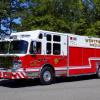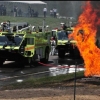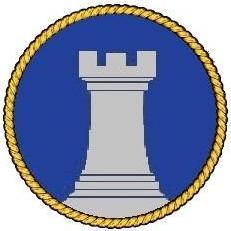
FireMedic049
Members-
Content count
608 -
Joined
-
Last visited
Reputation Activity
-
x635 liked a post in a topic by FireMedic049 in FDNY’s new entry exam asks about everything but firefighting
Considering their recruit training program and probationary process, prior firefighting knowledge while likely beneficial, isn't specifically necessary for a recruit to succeed in that system. To some extent, entry level civil service exams aren't specifically for testing job specific knowledge, but rather to evaluate a person's general knowledge, reading comprehension, ability to follow directions, ability to solve problems, etc.
Personally, I don't see a problem with this as long as the test is adequately assessing a candidate's mental aptitude for what is needed to complete recruit school and perform the job vs dumbing down the exam in order to achieve diversity at the expense of quality.
-
x635 liked a post in a topic by FireMedic049 in FDNY’s new entry exam asks about everything but firefighting
Considering their recruit training program and probationary process, prior firefighting knowledge while likely beneficial, isn't specifically necessary for a recruit to succeed in that system. To some extent, entry level civil service exams aren't specifically for testing job specific knowledge, but rather to evaluate a person's general knowledge, reading comprehension, ability to follow directions, ability to solve problems, etc.
Personally, I don't see a problem with this as long as the test is adequately assessing a candidate's mental aptitude for what is needed to complete recruit school and perform the job vs dumbing down the exam in order to achieve diversity at the expense of quality.
-
x635 liked a post in a topic by FireMedic049 in FDNY’s new entry exam asks about everything but firefighting
Considering their recruit training program and probationary process, prior firefighting knowledge while likely beneficial, isn't specifically necessary for a recruit to succeed in that system. To some extent, entry level civil service exams aren't specifically for testing job specific knowledge, but rather to evaluate a person's general knowledge, reading comprehension, ability to follow directions, ability to solve problems, etc.
Personally, I don't see a problem with this as long as the test is adequately assessing a candidate's mental aptitude for what is needed to complete recruit school and perform the job vs dumbing down the exam in order to achieve diversity at the expense of quality.
-
x635 liked a post in a topic by FireMedic049 in FDNY’s new entry exam asks about everything but firefighting
Considering their recruit training program and probationary process, prior firefighting knowledge while likely beneficial, isn't specifically necessary for a recruit to succeed in that system. To some extent, entry level civil service exams aren't specifically for testing job specific knowledge, but rather to evaluate a person's general knowledge, reading comprehension, ability to follow directions, ability to solve problems, etc.
Personally, I don't see a problem with this as long as the test is adequately assessing a candidate's mental aptitude for what is needed to complete recruit school and perform the job vs dumbing down the exam in order to achieve diversity at the expense of quality.
-
fire patrol nyc liked a post in a topic by FireMedic049 in Petition: Lower the volume of Ambulance sirens in New York City
Here's a thought, if the noise bothers you so much, maybe don't live in the most populated city in the country?
-
BIGRED1 liked a post in a topic by FireMedic049 in Topping Off SCBA Cylinders-"It's Not Full Until It's Cold And Full"
Thanks, just wanted to confirm we were talking about the same thing.
Right and that's what I was talking about. While checking my equipment the day after a fire, it's not uncommon to find some cylinders that have settled and need topped off.
That may be what you are used to, but in my area it's pretty common for cylinders to be filled on scene and not just for them to be reused at that incident. Most departments don't have air trucks either, but there are enough that one typically responds to most working fires. Many departments around here also don't have fill stations in the firehouse, which is part of the reason an air truck is usually requested at some point, even if you won't need to reuse them right away.
I would agree a 700psi drop is not good, but there generally isn't a build up of heat on the fill station end. At least nothing I've ever experienced. The heat is primarily generated by the air under pressure being pushed into the cylinder. The friction of the air passing thru the cylinder valve raises the temp of the air going in. The faster the flow, the hotter the air gets and that heat is transferred to the cylinder body.
-
fire patrol nyc liked a post in a topic by FireMedic049 in Petition: Lower the volume of Ambulance sirens in New York City
Here's a thought, if the noise bothers you so much, maybe don't live in the most populated city in the country?
-
BIGRED1 liked a post in a topic by FireMedic049 in Topping Off SCBA Cylinders-"It's Not Full Until It's Cold And Full"
Thanks, just wanted to confirm we were talking about the same thing.
Right and that's what I was talking about. While checking my equipment the day after a fire, it's not uncommon to find some cylinders that have settled and need topped off.
That may be what you are used to, but in my area it's pretty common for cylinders to be filled on scene and not just for them to be reused at that incident. Most departments don't have air trucks either, but there are enough that one typically responds to most working fires. Many departments around here also don't have fill stations in the firehouse, which is part of the reason an air truck is usually requested at some point, even if you won't need to reuse them right away.
I would agree a 700psi drop is not good, but there generally isn't a build up of heat on the fill station end. At least nothing I've ever experienced. The heat is primarily generated by the air under pressure being pushed into the cylinder. The friction of the air passing thru the cylinder valve raises the temp of the air going in. The faster the flow, the hotter the air gets and that heat is transferred to the cylinder body.
-
BIGRED1 liked a post in a topic by FireMedic049 in Topping Off SCBA Cylinders-"It's Not Full Until It's Cold And Full"
Which valve, the cylinder valve or the valve on the fill station?
But that's only if it's an incident of an extended duration in which you are using a lot of cylinders. It's pretty common for us to only need to fill most cylinders once while on scene. When that's the case, depending on who's doing the filling, it's not uncommon to see a drop in the pressure the next day necessitating topping them off.
-
Westfield12 liked a post in a topic by FireMedic049 in NYC Rescue Medics
Yeah, those have been on the streets for a little while now.
-
Westfield12 liked a post in a topic by FireMedic049 in NYC Rescue Medics
Yeah, those have been on the streets for a little while now.
-
x635 liked a post in a topic by FireMedic049 in Video: NFPA 1710 - The Industry Standard for Career Fire Departments
You missed my point.
I was addressing your question regarding the standard's personnel recommendation. It would be irresponsible for them to recommend an initial response that would be less than what they determined is needed.
Whether or not that is a reasonable response to an AFA or the department can achieve that response themselves is a different issue. If I'm not mistaken, 1710 recommendations are based on actual fires in a specific building type and not AFAs and other non-fire responses. So not sending 43 upfront to an AFA wouldn't necessarily be non-compliant.
-
x635 liked a post in a topic by FireMedic049 in Video: NFPA 1710 - The Industry Standard for Career Fire Departments
Because the science/research says that's what's needed to address the tasks that may need to be immediately performed.
While it may be true that sending 43 each and every time, everywhere is unrealistic, that in and of itself doesn't translate into not needing 43 when there's an actual fire.
Expanding on your line of thinking, the standard also calls for a minimum of 4 per apparatus and up to 6 for "high hazard" areas, yet many cities are staffing 2 or 3 on a piece. Although it may be unrealistic for many cities to staff 4 per piece, 4 is what it takes for a unit operating by itself to initiate interior operations under OSHA 2in/2out, unless there is an immediate life safety issue. As such, it would be irresponsible for an industry standard to recommend staffing that would require a unit to wait for another unit to arrive in order to get the first line in operation.
It would be equally irresponsible for an industry standard to recommend less firefighters than what the science/research says are needed overall, just because most cities are unable to commit that many on each response.
-
dwcfireman liked a post in a topic by FireMedic049 in Boston FD Selects MSA G1 SCBA
I could support that idea.
-
dwcfireman liked a post in a topic by FireMedic049 in Boston FD Selects MSA G1 SCBA
I could support that idea.
-
x635 liked a post in a topic by FireMedic049 in Boston FD Selects MSA G1 SCBA
Yes, it's supposed to, but some designs are better at it than others.
As for weight and ergonomic differences between Scott and MSA.......
My department evaluated SCBAs a couple years ago, right before the G1 was introduced. The brand we'd been using for a long time was no longer available, so we had to look into other brands and do a complete switch out. Personally, I thought that the Scott model that we demo'd (the next one down from the NxG7) felt noticeably heavier and less comfortable when wearing it compared to the MSA model we demo'd (M7 Firehawk).
I've always been a fan of Scott from my initial experience with the 2.2 model many moons ago and brief encounters since. I've used a couple different MSA models previously and they did the job well. However, IMO, the MSA was a far superior product in that comparison in almost every way. Not that the Scott was awful, but MSA was clearly better and giving them a run for their money.
Ultimately, Scott was selected and that's a different story. We've been using them for a little over 2 years now. They get the job done, but their ergonomics are not good in my opinion.
-
x635 liked a post in a topic by FireMedic049 in Boston FD Selects MSA G1 SCBA
Yes, it's supposed to, but some designs are better at it than others.
As for weight and ergonomic differences between Scott and MSA.......
My department evaluated SCBAs a couple years ago, right before the G1 was introduced. The brand we'd been using for a long time was no longer available, so we had to look into other brands and do a complete switch out. Personally, I thought that the Scott model that we demo'd (the next one down from the NxG7) felt noticeably heavier and less comfortable when wearing it compared to the MSA model we demo'd (M7 Firehawk).
I've always been a fan of Scott from my initial experience with the 2.2 model many moons ago and brief encounters since. I've used a couple different MSA models previously and they did the job well. However, IMO, the MSA was a far superior product in that comparison in almost every way. Not that the Scott was awful, but MSA was clearly better and giving them a run for their money.
Ultimately, Scott was selected and that's a different story. We've been using them for a little over 2 years now. They get the job done, but their ergonomics are not good in my opinion.
-
EmsFirePolice liked a post in a topic by FireMedic049 in City of Paterson Fire Dept EMS
That's not a 2016 model. That's at least 5 years old.
-
dwcfireman liked a post in a topic by FireMedic049 in Firefighters padding numbers or saving lives?
I can't put a number to it and it's not always the doctor themselves saying it, but in my experience it is a very, very, very common thing for a person to call their doctor and be told to go to the ER and oftentimes that includes calling 911 for an ambulance to take them.
-
dwcfireman liked a post in a topic by FireMedic049 in Firefighters padding numbers or saving lives?
I can't put a number to it and it's not always the doctor themselves saying it, but in my experience it is a very, very, very common thing for a person to call their doctor and be told to go to the ER and oftentimes that includes calling 911 for an ambulance to take them.
-
AFS1970 liked a post in a topic by FireMedic049 in What the Fire Service can Learn from the Aviation Industry
No rustled feathers here, but I think you're kind of on the wrong page.
Given the significantly different operating conditions, you can't directly apply all of the concepts to the fire service. You are correct, there is an inherent level of risk to the job that just can't be completely eliminated without eliminating the ability to do the job we are expected to perform. I don't think the "lessons" to be learned from the aviation industry are about elimination of risk, but rather following sound practices that can help reduce risk where we can reasonably do so.
As you pointed out, if something is mechanically wrong with the plane, the plane doesn't fly until it's fixed. In the fire service, we routinely respond with apparatus that is known to not be 100% mechanically sound.
Aircraft have somewhat strict maintenance requirements and many parts are serviced or replaced after a specific number of flights or hours in order to prevent "critical failures". In the fire service, many departments lack proper preventative maintenance programs and repairs are typically reactive rather than proactive.
Every person on the crew of the aircraft is fully trained in their duties before stepping foot on a plane to perform those duties with real passengers, each person has a specific role and sticks to that role (under normal conditions). As such, you don't see flight attendants flying the planes and the pilots passing out pillows and beverages. In the fire service, we have many departments that routinely allow personnel to respond to incidents before completing initial training and allow personnel to actively perform tasks that they are not trained to perform.
The aviation industry has checklists for performing routine tasks, like a pre-flight check and for situations that may arise. The checklists serve to help guide personnel thru the situation and ensure that important tasks are not overlooked. In the fire service, checklists can help to ensure nothing is overlooked during the apparatus check and can do the same thing for the IC during an incident to ensure that essential tasks and notifications are not missed and are performed in a timely manner. They can particularly help when dealing with a low frequency incident like a true hazmat situation, technical rescues, etc.
I see these types of things as where we can apply lessons learned rather than on scene decision making about strategy & tactics.
-
AFS1970 liked a post in a topic by FireMedic049 in What the Fire Service can Learn from the Aviation Industry
No rustled feathers here, but I think you're kind of on the wrong page.
Given the significantly different operating conditions, you can't directly apply all of the concepts to the fire service. You are correct, there is an inherent level of risk to the job that just can't be completely eliminated without eliminating the ability to do the job we are expected to perform. I don't think the "lessons" to be learned from the aviation industry are about elimination of risk, but rather following sound practices that can help reduce risk where we can reasonably do so.
As you pointed out, if something is mechanically wrong with the plane, the plane doesn't fly until it's fixed. In the fire service, we routinely respond with apparatus that is known to not be 100% mechanically sound.
Aircraft have somewhat strict maintenance requirements and many parts are serviced or replaced after a specific number of flights or hours in order to prevent "critical failures". In the fire service, many departments lack proper preventative maintenance programs and repairs are typically reactive rather than proactive.
Every person on the crew of the aircraft is fully trained in their duties before stepping foot on a plane to perform those duties with real passengers, each person has a specific role and sticks to that role (under normal conditions). As such, you don't see flight attendants flying the planes and the pilots passing out pillows and beverages. In the fire service, we have many departments that routinely allow personnel to respond to incidents before completing initial training and allow personnel to actively perform tasks that they are not trained to perform.
The aviation industry has checklists for performing routine tasks, like a pre-flight check and for situations that may arise. The checklists serve to help guide personnel thru the situation and ensure that important tasks are not overlooked. In the fire service, checklists can help to ensure nothing is overlooked during the apparatus check and can do the same thing for the IC during an incident to ensure that essential tasks and notifications are not missed and are performed in a timely manner. They can particularly help when dealing with a low frequency incident like a true hazmat situation, technical rescues, etc.
I see these types of things as where we can apply lessons learned rather than on scene decision making about strategy & tactics.
-
dwcfireman liked a post in a topic by FireMedic049 in What the Fire Service can Learn from the Aviation Industry
Part of the reason that the aviation industry has high standards is linked to the survival of their industry. Anytime a commercial jet crashes, there's typically significant casualties and likely causes at least some people to think twice about traveling by air. If a particular airline has a series of crashes over a short period of time, I'm sure it'll have an impact on airline choice by consumers as they'd likely choose an airline with a better safety record. Additionally, for the most part, there's alternative modes of transportation available if a person doesn't want to fly.
As a result, they have a vested interest in making things as safe as possible because ultimately it affects their bottom line. The fire service on the other hand has a captive customer base, a service monopoly and therefore little external motivation to improve.
There may not be a formal show titled "Firefighting Disasters", but there's certainly not a shortage of firefighting disaster videos out there.
-
dwcfireman liked a post in a topic by FireMedic049 in What the Fire Service can Learn from the Aviation Industry
The short answer to these questions is yes, yes we can.
The more important question is will we do it? Unfortunately, I'm pretty sure the answer to that is at best, maybe. I think there are probably some departments out there that are already applying at least some of it, but I know the vast majority of departments in my area (volunteer & primarily volunteer combination) won't even consider it. It's hard enough getting them to follow the best practices of our industry, let alone another.
-
dwcfireman liked a post in a topic by FireMedic049 in What the Fire Service can Learn from the Aviation Industry
The short answer to these questions is yes, yes we can.
The more important question is will we do it? Unfortunately, I'm pretty sure the answer to that is at best, maybe. I think there are probably some departments out there that are already applying at least some of it, but I know the vast majority of departments in my area (volunteer & primarily volunteer combination) won't even consider it. It's hard enough getting them to follow the best practices of our industry, let alone another.






